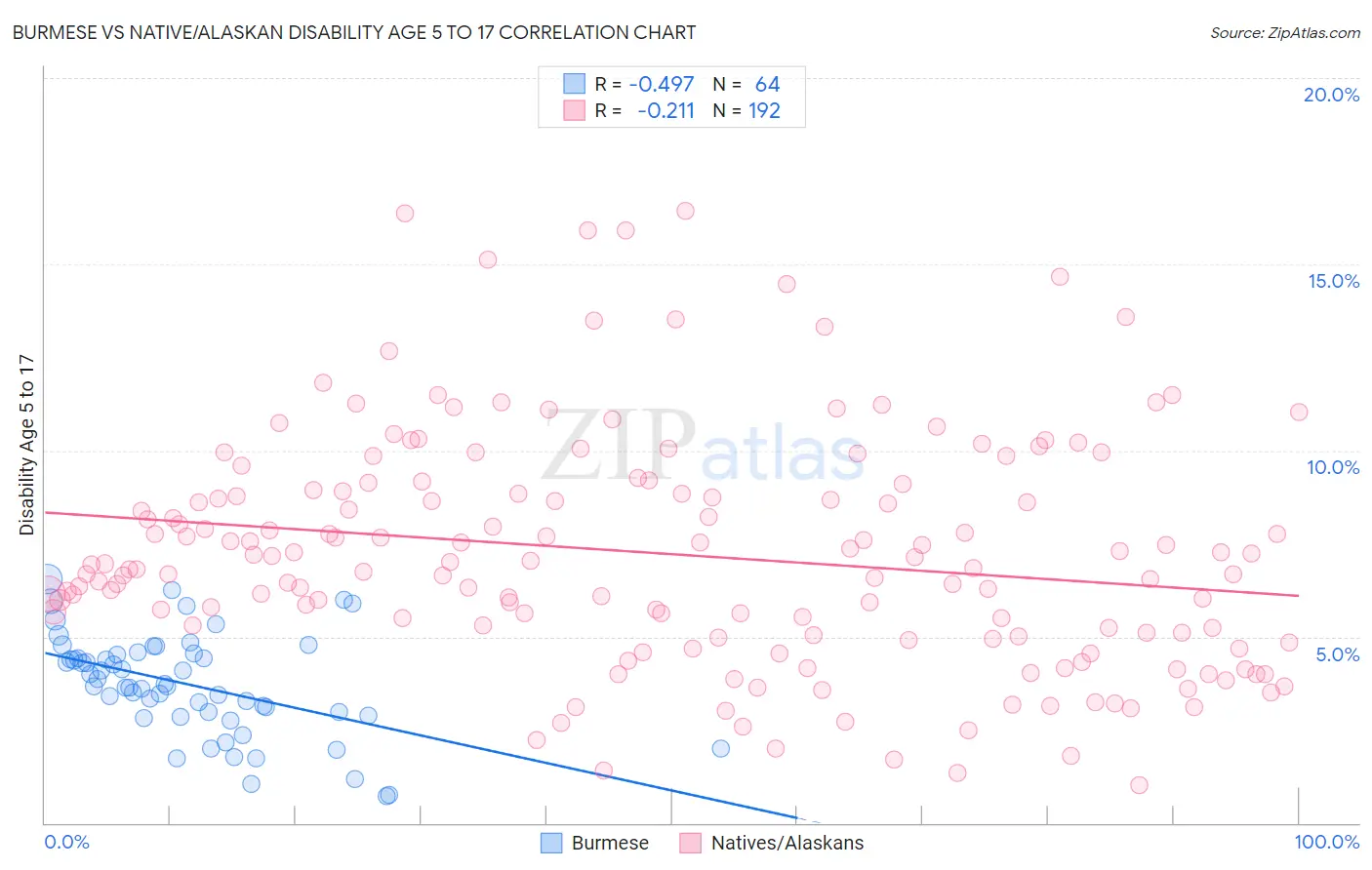Burmese vs Native/Alaskan Disability Age 5 to 17
COMPARE
Burmese
Native/Alaskan
Disability Age 5 to 17
Disability Age 5 to 17 Comparison
Burmese
Natives/Alaskans
4.8%
DISABILITY AGE 5 TO 17
100.0/ 100
METRIC RATING
20th/ 347
METRIC RANK
6.3%
DISABILITY AGE 5 TO 17
0.0/ 100
METRIC RATING
305th/ 347
METRIC RANK
Burmese vs Native/Alaskan Disability Age 5 to 17 Correlation Chart
The statistical analysis conducted on geographies consisting of 460,493,605 people shows a moderate negative correlation between the proportion of Burmese and percentage of population with a disability between the ages 5 and 17 in the United States with a correlation coefficient (R) of -0.497 and weighted average of 4.8%. Similarly, the statistical analysis conducted on geographies consisting of 506,009,662 people shows a weak negative correlation between the proportion of Natives/Alaskans and percentage of population with a disability between the ages 5 and 17 in the United States with a correlation coefficient (R) of -0.211 and weighted average of 6.3%, a difference of 31.9%.

Disability Age 5 to 17 Correlation Summary
| Measurement | Burmese | Native/Alaskan |
| Minimum | 0.73% | 1.0% |
| Maximum | 6.5% | 16.4% |
| Range | 5.8% | 15.4% |
| Mean | 3.7% | 7.2% |
| Median | 3.7% | 6.9% |
| Interquartile 25% (IQ1) | 2.9% | 5.1% |
| Interquartile 75% (IQ3) | 4.5% | 8.9% |
| Interquartile Range (IQR) | 1.6% | 3.8% |
| Standard Deviation (Sample) | 1.4% | 3.1% |
| Standard Deviation (Population) | 1.3% | 3.1% |
Similar Demographics by Disability Age 5 to 17
Demographics Similar to Burmese by Disability Age 5 to 17
In terms of disability age 5 to 17, the demographic groups most similar to Burmese are Yup'ik (4.8%, a difference of 0.22%), Immigrants from Uzbekistan (4.8%, a difference of 0.38%), Asian (4.8%, a difference of 0.56%), Immigrants from South Central Asia (4.7%, a difference of 0.87%), and Arapaho (4.7%, a difference of 0.89%).
| Demographics | Rating | Rank | Disability Age 5 to 17 |
| Thais | 100.0 /100 | #13 | Exceptional 4.7% |
| Immigrants | Korea | 100.0 /100 | #14 | Exceptional 4.7% |
| Chinese | 100.0 /100 | #15 | Exceptional 4.7% |
| Immigrants | Singapore | 100.0 /100 | #16 | Exceptional 4.7% |
| Arapaho | 100.0 /100 | #17 | Exceptional 4.7% |
| Immigrants | South Central Asia | 100.0 /100 | #18 | Exceptional 4.7% |
| Immigrants | Uzbekistan | 100.0 /100 | #19 | Exceptional 4.8% |
| Burmese | 100.0 /100 | #20 | Exceptional 4.8% |
| Yup'ik | 100.0 /100 | #21 | Exceptional 4.8% |
| Asians | 100.0 /100 | #22 | Exceptional 4.8% |
| Immigrants | Bolivia | 100.0 /100 | #23 | Exceptional 4.8% |
| Immigrants | Lebanon | 100.0 /100 | #24 | Exceptional 4.8% |
| Immigrants | Asia | 100.0 /100 | #25 | Exceptional 4.8% |
| Bhutanese | 100.0 /100 | #26 | Exceptional 4.9% |
| Taiwanese | 100.0 /100 | #27 | Exceptional 4.9% |
Demographics Similar to Natives/Alaskans by Disability Age 5 to 17
In terms of disability age 5 to 17, the demographic groups most similar to Natives/Alaskans are Nonimmigrants (6.3%, a difference of 0.10%), Senegalese (6.3%, a difference of 0.14%), Yakama (6.3%, a difference of 0.22%), Bahamian (6.3%, a difference of 0.24%), and Celtic (6.3%, a difference of 0.33%).
| Demographics | Rating | Rank | Disability Age 5 to 17 |
| Lumbee | 0.0 /100 | #298 | Tragic 6.2% |
| Welsh | 0.0 /100 | #299 | Tragic 6.3% |
| Carpatho Rusyns | 0.0 /100 | #300 | Tragic 6.3% |
| U.S. Virgin Islanders | 0.0 /100 | #301 | Tragic 6.3% |
| Celtics | 0.0 /100 | #302 | Tragic 6.3% |
| Yakama | 0.0 /100 | #303 | Tragic 6.3% |
| Senegalese | 0.0 /100 | #304 | Tragic 6.3% |
| Natives/Alaskans | 0.0 /100 | #305 | Tragic 6.3% |
| Immigrants | Nonimmigrants | 0.0 /100 | #306 | Tragic 6.3% |
| Bahamians | 0.0 /100 | #307 | Tragic 6.3% |
| Scotch-Irish | 0.0 /100 | #308 | Tragic 6.3% |
| Hmong | 0.0 /100 | #309 | Tragic 6.3% |
| Alaskan Athabascans | 0.0 /100 | #310 | Tragic 6.3% |
| Immigrants | Dominica | 0.0 /100 | #311 | Tragic 6.3% |
| Bermudans | 0.0 /100 | #312 | Tragic 6.4% |